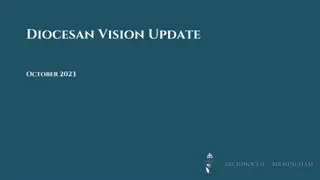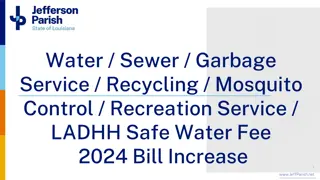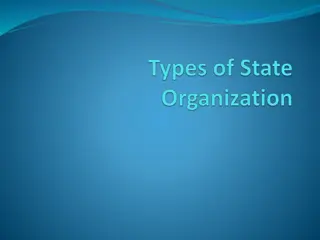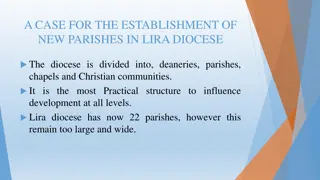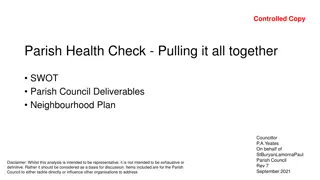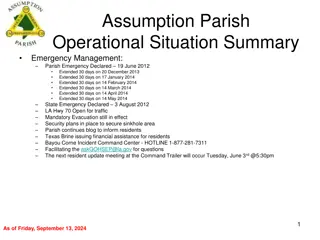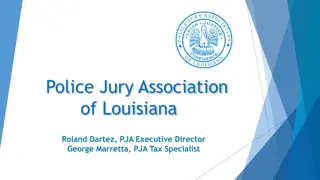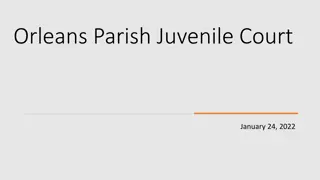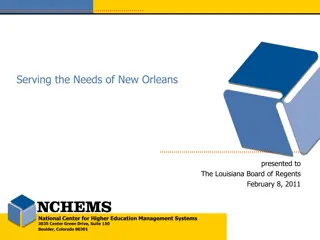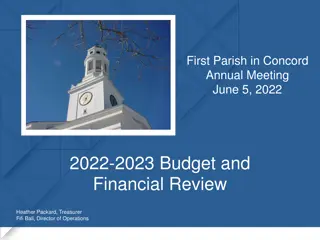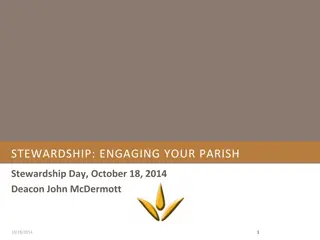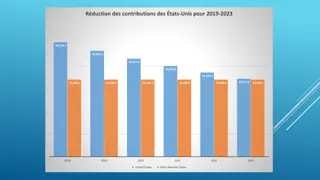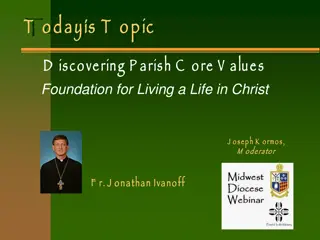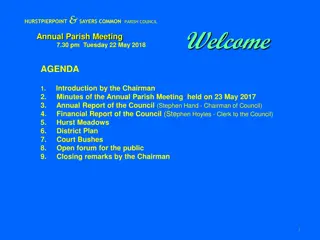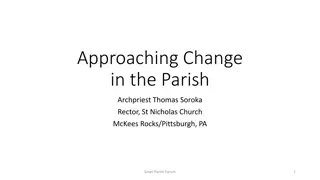Legal Case Analysis: St. Bernard Parish Government v. United States
St. Bernard Parish Government and property owners filed a case under the Tucker Act, alleging a taking due to flood damage from Hurricane Katrina. The Claims Court found in favor of the plaintiffs, which the government appealed. The case involves issues of government liability, impact of the Mississippi River-Gulf Outlet channel, and claims of inadequate compensation.
Download Presentation

Please find below an Image/Link to download the presentation.
The content on the website is provided AS IS for your information and personal use only. It may not be sold, licensed, or shared on other websites without obtaining consent from the author. Download presentation by click this link. If you encounter any issues during the download, it is possible that the publisher has removed the file from their server.
E N D
Presentation Transcript
St. Bernard Par. Govt v. United States, 887 F.3d 1354 (Fed. Cir. 2018) Saint Bernard Parish Government and various other owners of real property in St. Bernard Parish or in the Lower Ninth Ward of the City of New Orleans (collective- ly plaintiffs ) brought suit in the Court of Federal Claims ( Claims Court ) under the Tucker Act, 28 U.S.C. 1491(a)(1), alleging a taking. They claimed that the government was liable for flood damage to their proper- ties caused by Hurricane Katrina and other hurricanes. Plaintiffs theory was that the government incurred liability because of government inaction, including the failure to properly maintain or to modify the Mississippi River-Gulf Outlet ( MRGO ) channel, and government action (the construction and operation of the MRGO channel). The Claims Court found a taking occurred and awarded compensation. The government appeals, and plaintiffs cross-appeal alleging that the Claims Court s compensation award was inadequate.
Did the Fed Cir Know this was BS? 1. However, the Claims Court somewhat inconsistently noted that some evidence suggested that MRGO did not significantly impact the height of Katrina s storm surge, not because the funnel effect was nonexistent, but because the storm was so great it nullified the impact of either the wetlands or the intersection of MRGO and the GIWW the funnel at the height of the surge. J.A. 18361.
Inverse Condemnation This is an inverse condemnation case. Inverse condemnation is the means by which a landowner may recover just compensation under the Fifth Amendment for a physical taking of his property when condemnation proceedings have not been instituted. United States v. Clarke, 445 U.S. 253, 257 (1980). The inverse condemnation claim here is based on a taking of a flowage easement. It is well established that the government cannot take such an easement without just compensation.
Temporary Taking Most recently, in Arkansas Game & Fish Commission v. United States, 568 U.S. 23, 34 (2012), the Supreme Court held that temporary, government-induced flooding may give rise to a claim for the taking of a flowage easement. Thus, the issue presented is whether the increased flooding from MRGO constituted a temporary taking.
Proving a Temporary Taking Proof of such a claim requires the plaintiffs to establish that government action caused the injury to their properties that the invasion was the direct, natural, or probable result of an authorized activity. Establishing liability for a temporary taking also requires proof that the invasion was either intentional or foreseeable.
Did the Government Act at All? The Claims Court s finding of liability here is based in large part on the failure of the government to take action, particularly on its failure to maintain MRGO or to modify it. .. In finding a causal link between MRGO and storm surge, the Claims Court cited expert testimony noting that there was no evidence that the MRGO project was ever modified to reduce the predictable excess surge stresses and wave attack.
No Takings Based on Failure to Act While the theory that the government failed to maintain or modify a government-constructed project may state a tort claim, it does not state a takings claim. A property loss compensable as a taking only results when the asserted invasion is the direct, natural, or probable result of authorized government action. On a takings theory, the government cannot be liable for failure to act, but only for affirmative acts by the government. The government s liability for a taking does not turn, as it would in tort, on its level of care.
Failure to Provide Adequate Flood Protection In United States v. Sponenbarger, 308 U.S. 256 (1939), the government built a flood protection system. The plaintiff complained that the system was inadequate to protect the plaintiff s property from flooding. In finding that there was no taking, the Supreme Court held that [w]hen undertaking to safeguard a large area from existing flood hazards, the Government does not owe compensation under the Fifth Amendment to every landowner which it fails to or cannot protect.
The Lack of Precedent for Takings based on Failure to Act Plaintiffs point to no case where the government incurred takings liability based on inaction. Takings liability must be premised on affirmative government acts. The failure of the government to properly maintain the MRGO channel or to modify the channel cannot be the basis of takings liability. Plaintiffs sole remedy for these inactions, if any, lies in tort.
Causation It is well established that a takings plaintiff bears the burden of proof to establish that the government action caused the injury. Causation requires a showing of what would have occurred if the government had not acted. In order to establish causation, a plaintiff must show that in the ordinary course of events, absent government action, plaintiffs would not have suffered the injury.
What about the Overall Flood Protection? Plaintiffs on appeal are clear that in their view the LPV levees cannot be considered in the causation analysis. Plaintiffs argue that the Claims Court properly analyzed whether Plaintiffs properties would have flooded absent MRGO, not whether they would have flooded absent both MRGO and the LPV levee system. The result is that plaintiffs failed to take account of other government actions specifically the LPV project including the construction of a vast system of levees to protect against hurricane damage that mitigated the impact of MRGO and may well have placed the plaintiffs in a better position than if the government had taken no action at all.
The Standard The plaintiffs approach to causation is simply inconsistent with governing Supreme Court and Federal Circuit authority, particularly in flooding cases. These cases establish that the causation analysis must consider the impact of the entirety of government actions that address the relevant risk. [I]f governmental activities inflict slight damage upon land in one respect and actually confer great benefits when measured in the whole, to compensate the landowner further would be to grant him a special bounty. Such activities in substance take nothing from the landowner. [Since some of the plaintiffs are below sea level, what would New Orleans look like with no federal flood control projects?]
The Holding In summary, we conclude that the allegations of government inaction do not state a takings claim, and that plaintiffs have not established that the construction or operation of MRGO caused their injury. In light of our disposition, we do not reach the other issues.
In re Downstream Addicks, No. 17-9002, 2020 WL 808686 (Fed. Cl. Feb. 18, 2020) Thus, plaintiffs claims are essentially that they were entitled to perfect flood control, simply because government set up a flood control system to help protect residents in the Houston area. Plaintiffs also claim that the mere presence of the water control structures means that the government owned all waters that passed through them. So, do plaintiffs have the right to be perfectly protected from flooding? The simple answer is no; the right to perfect flood control it is not recognized by either Texas property law or federal law. The purpose of the Constitution s Fifth Amendment protections is to protect legally recognized property rights, but those property rights can only be created by the states or the federal legislative and executive departments. [Taken with the St. Bernard Case, does this clearly establish that the federal government has no duty to provide flood protection?]






![❤[PDF]⚡ Civil War Talks: Further Reminiscences of George S. Bernard and His Fel](/thumb/20551/pdf-civil-war-talks-further-reminiscences-of-george-s-bernard-and-his-fel.jpg)
